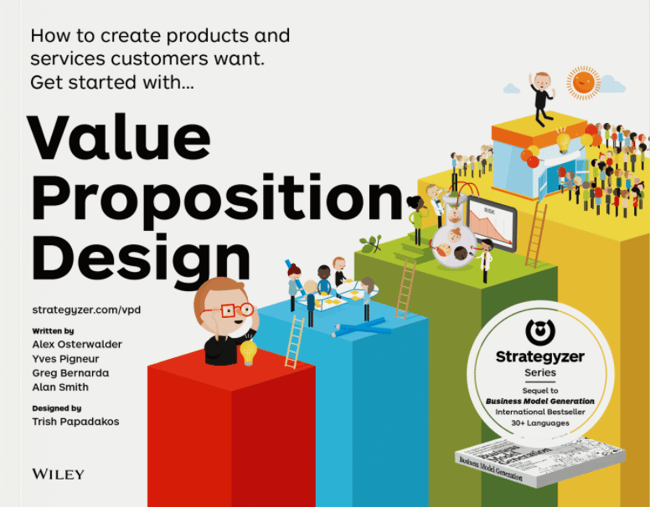
Consulting USPs need to die a brutal death. Here’s why.
.jpg?width=56&name=francescorizzato8%20(1280px).jpg)
The marketers are telling us, consultants, we need a USP, a Unique Selling Proposition. I get that. With a distinctive positioning as consultants, we can stand out in our crowded markets.
Unfortunately, I deeply struggle with the way 95% of all consultants develop such a USP. I am going to be tough on you.
Heck, your unique selling proposition is about your client, not about you
Most consulting USPs are made of useless, self-centered bragging, help!
While many consultants do not succeed in clearly (or not at all) unfolding their true distinctiveness, many others make their cooked-up USPs all about themselves.
Most consultants make the big mistake of telling their prospects an inside-in story: what THEIR unique services are, how exceptional THEIR experience is, how many years of awesome experience THEY have, and on and on and on. It’s all about bragging about THEIR so-called unique expertise, unique service, unique blah blah blah.
Consulting USPs? The big inside-in, know-it-all self-promotion!
I am always astonished looking at websites from consultants or consultancies. Everybody is kind of telling the same things, so they aren’t unique at all. Consultants seem to sort of copy and paste from each other all the time. Amazing.
They all use the same generic business terms, such as growth, transformation, change, digital, cloud, etc., in self-centered stories full of empty, pretentious promises and a horrible lack of proof.
USP? Unfortunately not, what they are doing is unappealing and pure commodity. And worst of all, they fail to connect the dots of what that means for their clients.
Recommended reading: There Are Two Ways Of Doing Consulting, One Is Toxic
Forget USP. Welcome to the UVP.
I am always surprised that only very few consultants thoroughly understand value proposition design.
Instead of a USP, consultants should start elaborating their UVP, their Unique Value Proposition. And they should all have the Value Proposition Design book on their desk, like me. All the time.

When I ask consultants to describe their value proposition, in most cases, they immediately start explaining to me their so-called unique services and/or the way they do business. Boy, you are not unique. There are 1000’s of other consultants doing precisely the same thing, have the same background, and have similar years of experience.
It seems like a massive contradiction for many consultants: “How am I supposed to grow my consulting business by NOT ‘displaying’ all my expertise on my website, Luk?”
Here’s my straightforward answer: You’ve got to shift the focus from you and your self-proclaimed ‘unique services' to the problems and pains of your prospects and/or clients.
Your value proposition should focus on your specific audience with their specific, prototypical pain points and the value you can deliver to them to solve those problems.
Ask yourself 3x a week (and every week again): What keeps your audience awake at night? In THEIR language, not in your language.
Value proposition design is all about going beyond your self-proclaimed ‘unique services’ toward a deep understanding of client value creation. As I always say: it’s not what it IS (inside view) but what it DOES to your client (outside view).
Remember that sentence. It might help you when you struggle with creating an outside-in view. Write it on a big poster and stick it on the wall:
It’s not what it IS but what it DOES.
And what about YOUR own story, background, experience, and credentials?
Of course, your inimitable ‘background story’ - the clients you’ve worked with, the knowledge you’ve accumulated over the years, the types of projects you’ve completed - are all part of your overall, distinctive value proposition. Big time! Don’t get me wrong.
However, here is the difference: instead of self-centered consulting blah blah, you are connecting the dots between your background story and your client-centered value proposition.
In other words, everything you learned all those years about those specific pain points of your specific audience will add tremendous value to their future problem-solving journey.
And this background story, therefore, is always problem-resolution focused (and never self-promoting!): what did you learn all those years that the client can leverage to solve their pain/problem?
Your consulting expertise is probably not truly exceptional, but YOU certainly are. Therefore, ‘the YOU’ is an indispensable part of your value proposition. Inject what’s unique about the way YOU think, how YOU support your value proposition, and how YOU deliver it. Competitors can never copy 'the YOU' in their service!
Keep the problems, the challenges, the struggles of your audience at the forefront of your mind and your goals, and use your incomparable story to show them how they can implement what you’ve learned to achieve similar results.
The best consultants I meet are also exceptional teachers: they educate their buyers/clients, share best practices with them, tell them what to look out for, give them valuable tips on achieving success, and demonstrate how they’ve helped others in their shoes.
Your homework as a consultant: crafting an integrated ‘strategic narrative’
Here’s your final homework in one sentence: you will need to craft - what I call - an integrated ‘strategic narrative’ connecting the dots between the client-centered value proposition and your inimitable background story, incorporating your problem-resolution credentials.
Let’s get rid of that inward-looking, self-absorbed bragging. If you get the ‘strategic narrative’ right, I can almost guarantee you will draw in your audience.
Long live the client-centered value proposition!
Recommended reading: There Are Two Ways Of Doing Consulting, One Is Toxic
Interested in receiving all my learnings to become a better consultant? No spam, no BS. Pure teaching! Subscribe to my newsletter.
.jpg?width=66&name=francescorizzato8%20(1280px).jpg)
Luk’s extensive career in the consulting business, which spans more than 20 years, has seen him undertake a variety of influential positions. He served as the European CHRO for Nielsen Consulting (5,000 consultants in the EU), founded iNostix in 2008—a mid-sized analytics consultancy—and led the charge in tripling revenue post-acquisition of iNostix by Deloitte (in 2016) as a leader within the Deloitte analytics practice. His expertise in consultancy performance improvement is underlined by his former role on Nielsen's acquisition evaluation committee. After fulfilling a three-year earn-out period at Deloitte, Luk harnessed his vast experience in consultancy performance improvement and founded TVA in 2019. His advisory firm is dedicated to guiding consulting firms on their path to becoming high-performing firms, drawing from his deep well of consulting industry expertise and financial acumen.

